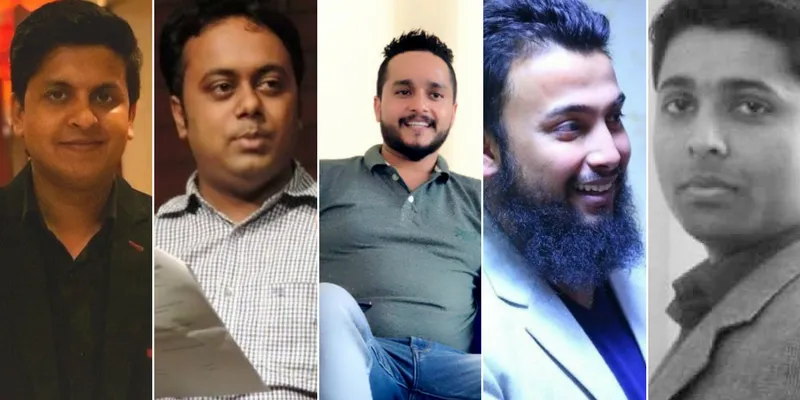This legal tech startup is helping people without money fund and fight their cases
Started in 2016, Advok8 offers a range of legal aid services like case tracking, digital appointment booking, and litigation funding, among others.

According to data released in 2016, the total number of pending civil cases in the Supreme Court is 48,418. The apex court’s numbers might still look better than those pending in all the High Courts, District and Subordinate courts across the country, for which the number of pending civil cases exceeds more than 31 lakhs (data as per 2014).
A few reasons that contribute to our overburdened judicial system include increasing number of legislations, accumulation of first appeals, and the number of revisions among many others.
“To add to these, irregular payments to advocates that demotivate them and lack of proper arrangement to digitally monitor and track cases for hearing are also hindering factors,” according to Saurav Kumar Sinha, one of the co-founders of Advok8, a new age legal tech startup based in New Delhi.
The first of the few
So what are legal tech startups all about in the first place?
To put it in simple terms, they are startups that use technology to aid legal services in civil cases, like finding lawyers to start incorporation, to draft share holder agreement and co-founder agreement, and help in other legalities, explains the 28-year-old.
Established in 2016, Advok8 is among the first few legal tech startups in India that offer a range of legal aid services ranging from case tracking, digital appointment booking and litigation funding. Its founding team comprises five enterprising youngsters who come from different backgrounds like law, software engineering, consulting, insurance and technology.

“We often heard from various relatives and friends who were facing trouble fighting their civil cases in different courts. Often failure to make regular payments to advocates discouraged the latter to pursue and follow up on cases rigoursly.
Moreover, lawyers were likely to miss out on appeal/hearing dates for it is difficult for them to keep track of progress on multiple cases,” says Saurav as he elaborates on what motivated them to start Advok8.
Range of legal aid services
Advok8’s app facilitates free appointment bookings by litigants looking for advocates to address their problems. Apart from this, the app’s case tracking feature also enables both lawyers and litigants to track the latest updates of their civil cases at a nominal charge. While lawyers have to pay Rs 199 to track a particular case every year, for litigants it’s Rs 99 per case.
This sort of eliminates the hassle of lawyers/ litigants having to follow up manually with courts and several law clerks on the latest updates in their cases. So the way you track your food delivery, you can even track your case progress and related details, clarifies Saurav.
Legisl8, another platform of Advok8 also acts like a “LinkedIn” for lawyers where they can create their professional identities on the web and stay updated on the latest news and developments related to their specialisations. “They can also find and connect with other legal professionals and apply to the best jobs, internships and courses from leading institutions,” shares Saurav.
However, 80 percent of Advok8’s revenues are generated through third party litigation funding.
Litigation funding, a fairly new concept
Litigation funding refers to third parties like legal tech startups or other insurance companies to cover the legal costs of pursuing a case after it has been carefully assessed and vetted. Even though this concept is still being debated upon, it’s already becoming a trend in the legal tech sector for it promises to be powerful in safeguarding the rights of women and other minorities.
At Advok8, we angel invest in the justice enabling system. We pay for legal fees and own a portion of the lawsuit’s recovery. While legal costs can often be prohibitively expensive for individuals or small businesses, litigation funding helps those cases have their day in court, says Saurav.

Once litigants/lawyers representing the petitioner apply for funding of their cases via the Advok8 website or app, the cases are evaluated using a proprietary algorithm that estimates the likely duration of the case and odds of winning, based on factors such as the judge, court type, and lawyers for both parties, and other related facts about the case.
“In cases where the chances of winning are bleak, we also suggest out-of-court settlements that reduce the number of litigations for our courts and also benefit litigants by saving their resources,” says Saurav.
Based on its guidelines for risk and expected return, the company then decides whether or not to underwrite the case in amounts up to 10, 00,000. The team at Advok8 also uses its in-house artificial intelligence system to review the cases along with further assessment by an experienced legal team of 25 empaneled lawyers.
Challenges and the road ahead
Though Advok8 started offering litigation funding only from this year, it has already received over 70 cases with requests ranging from several dowry victims to troubled farmers fighting for their rights.
With a network of over 10,000 lawyers and over two lakh cases on its database, the Advok8 team terms its work and related challenges bold and offbeat.
It is bold because getting into legalities is synonymous with making enemies easily and offbeat since our primary motive is not about making profits but helping people in need, specifies Saurav.
“Everything in the legal set up is mostly done in an orthodox way. Hence, one of the greatest challenges was also to convince several lawyers to believe in our vision and support digitising measures,” he adds.
Advok8 was boosted by a round of angel investment last month. It is also working towards initiating legal insurance in India and enabling prevention based law practices which help in reduction of cases.
“Despite several constraints, the genuine cases of needy people who call us for help every day inspires us to work hard,” concludes Saurav.







